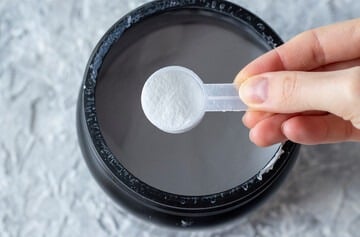Creatine: Benefits, Usage, and Considerations
Creatine is a popular and extensively researched supplement in the fitness world. Known for its role in enhancing strength and muscle performance, creatine has gained a reputation as one of the most effective and safe supplements for athletes, bodybuilders, and fitness enthusiasts. But what exactly is creatine, and how does it work? Here’s a comprehensive look into this powerhouse supplement, its benefits, and how to use it safely.
MEN'S HEALTH
11/7/20243 min read


1. What is Creatine?
Creatine is a natural substance found in small amounts in certain foods, like red meat and fish, and is produced in the body by amino acids. It is stored in the muscles and used for short, intense bursts of energy, like sprinting or weightlifting. When you take creatine as a supplement, it increases the body’s store of phosphocreatine, which is used to produce adenosine triphosphate (ATP), the primary energy currency for muscle contractions.
2. Benefits of Creatine
Creatine offers numerous benefits, especially for those focused on strength and muscle gains:
Improved Strength and Power: Creatine is one of the most effective supplements for enhancing muscle strength and power. Studies show that it helps increase workload, allowing you to lift heavier weights and train more intensely, which promotes faster gains in muscle mass and strength.
Enhanced Muscle Growth: In addition to strength, creatine can also support muscle hypertrophy (growth). It pulls water into muscle cells, which can make muscles look fuller and support the environment needed for muscle growth.
Faster Recovery: By increasing energy stores, creatine helps reduce muscle cell damage and inflammation during intense exercise, leading to faster recovery times between workouts. This is essential for those who train regularly or have a high-volume workout schedule.
Improved Endurance in High-Intensity Workouts: While creatine is most beneficial for short, high-intensity exercise, it can also improve endurance for repeated bouts of activity, such as circuit training or sports with stop-and-go action like soccer or basketball.
Potential Cognitive Benefits: Emerging research suggests that creatine may also offer cognitive benefits, especially in individuals who are sleep-deprived or older adults. Because the brain uses ATP, creatine’s role in energy production may positively impact brain function, though more research is needed.
3. Types of Creatine
The most common form of creatine is creatine monohydrate, which is the most studied and widely used. It is cost-effective, well-researched, and proven to be effective. Other types include creatine ethyl ester, creatine hydrochloride, and buffered creatine, though there is limited evidence that they are more effective than creatine monohydrate.
4. How to Use Creatine
The standard recommended dose for creatine is:
Loading Phase (Optional): 20 grams per day, divided into 4 doses, for 5-7 days. This phase saturates your muscles quickly, allowing you to experience benefits sooner.
Maintenance Dose: After loading, take 3-5 grams per day. This dose helps maintain high levels of creatine in your muscles without the need for a loading phase.
Creatine can be taken at any time, but it’s often consumed after workouts to aid muscle recovery. Mixing creatine with water or juice is effective, as it dissolves easily and has a neutral taste.
5. Safety and Side Effects
Creatine is widely considered safe for most people when taken in recommended doses. Here are a few important things to consider:
Water Retention: Creatine can cause water retention in muscles, which may lead to a slight increase in weight. This is normal and usually subsides over time or if creatine use is discontinued.
Kidney Health: There has been concern that creatine might harm kidney function, but research shows it is safe for healthy individuals with normal kidney function. However, those with pre-existing kidney issues should consult a healthcare provider before starting creatine.
Stomach Discomfort: Some people may experience mild gastrointestinal discomfort, especially during the loading phase. Reducing the dose or skipping the loading phase can help alleviate this.
Caffeine Interaction: There’s some evidence suggesting that high doses of caffeine might reduce creatine’s effectiveness, so it may be wise to limit caffeine consumption when using creatine.
6. Who Should Use Creatine?
Creatine is beneficial for a wide range of individuals, including:
Strength Athletes and Bodybuilders: Those looking to improve their strength, muscle growth, and power during workouts will likely experience significant benefits from creatine.
High-Intensity Athletes: Athletes in sports that require explosive bursts of energy, like sprinting, powerlifting, and football, can benefit from creatine’s energy-boosting effects.
Older Adults: Some studies show creatine may help older adults retain muscle mass and improve muscle strength, which can be valuable in maintaining physical function and reducing the risk of falls.
Vegetarians and Vegans: Since creatine is found primarily in animal products, vegetarians and vegans may have lower creatine stores and could benefit more from supplementation.
7. Debunking Common Myths
Despite its popularity, creatine has been surrounded by myths:
Creatine Causes Dehydration: There’s no scientific evidence to support that creatine causes dehydration. Proper hydration is always recommended during any supplementation.
Creatine is a Steroid: Creatine is not a steroid. It’s a natural substance that enhances ATP production, which is different from how anabolic steroids work in the body.
It Only Benefits Bodybuilders: While popular among bodybuilders, creatine benefits a variety of athletes, especially those involved in high-intensity and short-duration activities.
Conclusion
Creatine is a well-researched and safe supplement that can significantly enhance physical performance, muscle growth, and possibly even cognitive function. For those looking to take their workouts to the next level, creatine is a cost-effective and reliable option. Remember to take it as recommended, stay hydrated, and consult a healthcare professional if you have any medical conditions or concerns.
Follow us on social media
Explore fitness articles and personal training options.
Fitness Jobs
© 2024. All rights reserved.
